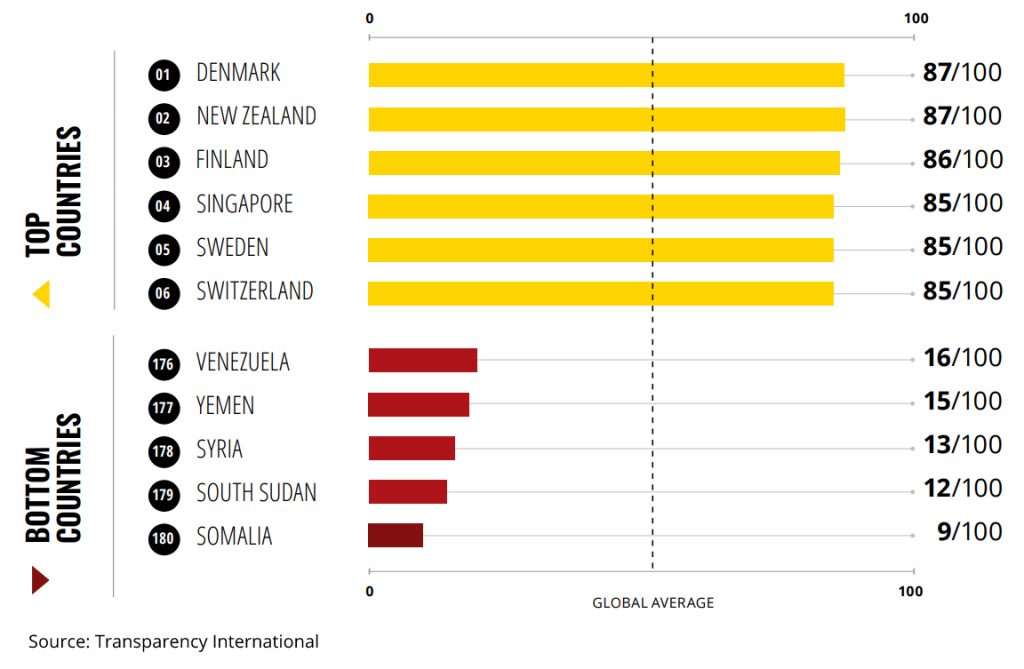Denmark and New Zealand are the least corrupt countries in the world while Somalia is the most corrupt. This is based on the 2019 results of the Corruption Perceptions Index (CPI), an annual study by Transparency International.
Highlights
For this year’s edition, 180 countries were included in the study. Among these countries, Denmark and New Zealand attained the highest CPI score of 87, meaning they are deemed to be clean governments. This is followed by Finland (86). Finland is followed by Singapore, Sweden, and Switzerland in a triple tie (85).
On the opposite extreme, Somalia scored the lowest CPI at only 9 out of 100. Other low scorers are South Sudan (12), Syria (13), Yemen (15), and Venezuela (16).
The global average is at 43, with two-thirds of the countries included in the study gaining CPI scores that are below 50.
From our partners:
The Western Europe & European Union is the region with the highest average score at 66. Meanwhile, the Sub-saharan Africa recorded the lowest average CPI at 32. Last year, these regions were also the best and the worst, respectively.
Measuring corruption
In order to come up with the CPI, Transparency International aggregates from 13 data sources collected by 12 trusted institutions. The data points are the perceptions of businessmen and country expects with regards to the level of corruption of a particular country’s public sector.
The collected information from these sources are mathematically standardized to attain the same scale. Afterwards, the scores of a country are averaged. This average score is a country’s CPI value.
CPI is a measure of corruption that ranges from 0 to 100, with a 0 indicating that a country is highly corrupt and 100 indicating that a country’s public sector is very clean.
In order to be included in the study, at least three data sources must have assessed a country, otherwise, they are dropped.
Ending corruption
Even in the top countries, corruption remains to be a problem that needs to be battled. With this, Transparency International gave some recommendations to put an end to corruption and to restore trust in the public sector.
- Manage conflicts of interest, by tightening the control of the government in its areas of interest such as finance
- Control political financing, by properly enforcing campaign finance regulations
- Strengthen electoral integrity, by ensuring fair elections
- Regulate lobbying activities, by making them more accessible to the public
- Tackle preferential treatment, by making sure that service delivery and resource allocation are not driven by misaligned interests
- Empower citizens, by protecting their civil liberties and political rights
- Reinforce checks and balances, by the promotion of the separation of powers and judicial independence.
“Governments must urgently address the corrupting role of big money in political party financing and the undue influence it exerts on our political systems,” Transparency International Chair Delia Ferreira Rubio noted.
To finally end corruption, there is a need for genuine public servants who are willing to cut the opportunities for corruption and to strengthen existing political frameworks.
This is, of course, a highly idealistic notion that is easier said than done, especially given the existence of governments whose interest is only to serve themselves.
Hopefully, our desire to have a clean and equitable public sector is not too absurd a proposition that in the end will be reduced to nothing but wishful thinking.














